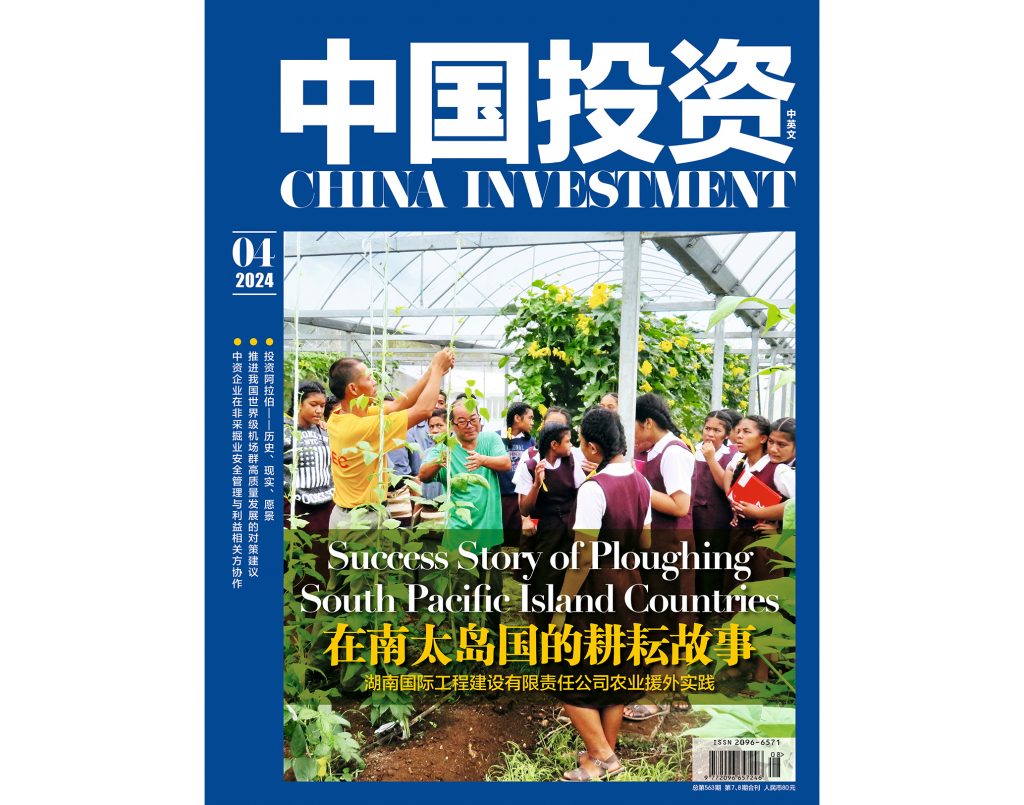
4月号封面文章
在南太岛国的耕耘故事
湖南国际工程建设有限责任公司农业援外实践
● 脚踏实地的中国援农特色——专访汤加王国官员Viliami T. Manu 和密克罗尼西亚联邦官员Semes Silbanus、Eugene Joseph / 蔡雨恬 黄凯伦 唐溪源
● “提高了本地居民收入,改善了生活水平”——专访援密克罗尼西亚联邦农业技术项目专家代表 / 黄凯伦 宋睿 唐溪源
● 援助与教学共进,助力南太改善民生——专访汤加王国和密克罗尼西亚联邦农户和学生代表 / 宋睿 唐溪源
● 小生态有大效用——“猪- 沼- 菜”生态循环清洁农业模式在南太地区的应用与推广 /蔡雨恬 唐溪源
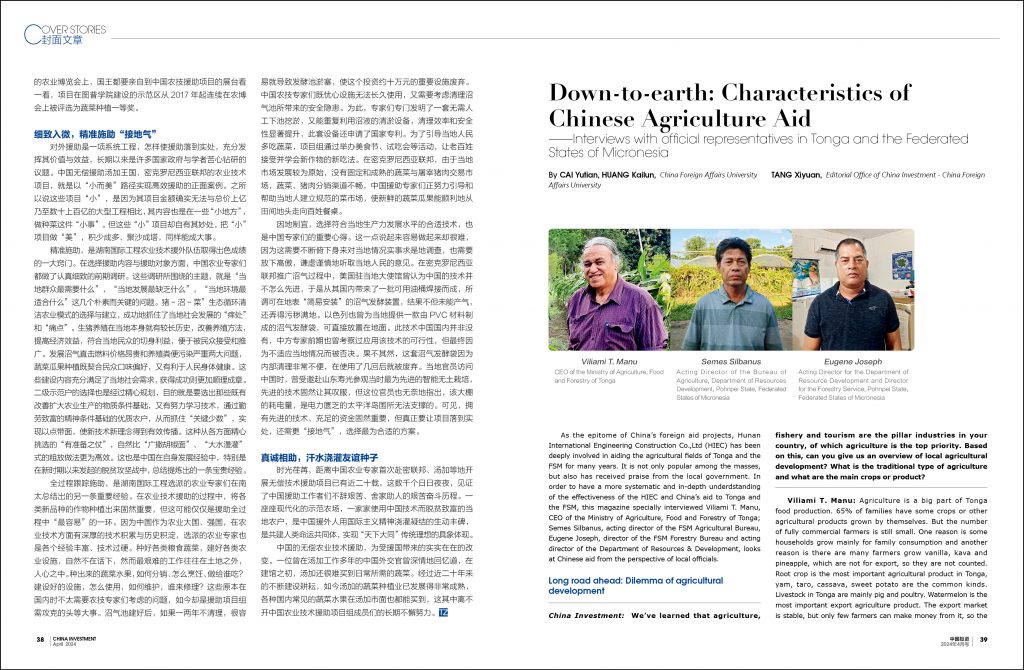
文|蔡雨恬 黄凯伦 外交学院 唐溪源 本刊研究部、外交学院 图片提供|湖南国际工程建设有限责任公司 翻译|卢婕妤 蔡雨恬
导读
●道阻且长:农业发展的困局
●足履实地:中国援助项目的破局之策
●行稳致远:双边合作的典范
●大有可为:走向互利共赢
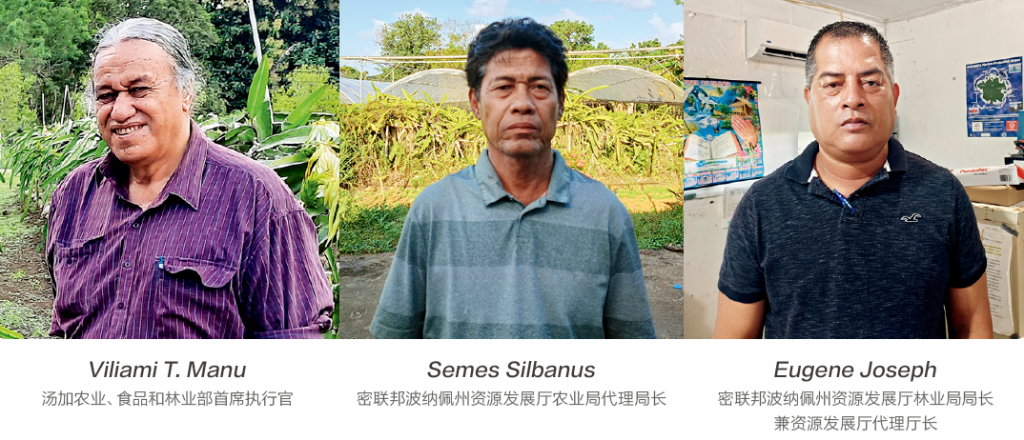
作为中国援外项目的缩影,湖南国际工程建设有限责任公司(以下简称湖南国际工程)多年来深耕援汤加和密联邦农业领域,不仅在群众中广受欢迎,也收获了当地政府的好评。为更系统和深入地了解湖南国际工程以及中国援汤援密项目的实效,本刊特约专访汤加农业、食品和林业部首席执行官Viliami T. Manu,密联邦波纳佩州资源发展厅农业局代理局长Semes Silbanus以及密联邦波纳佩州资源发展厅林业局局长兼资源发展厅代理厅长Eugene Joseph,从当地官员视角看中国援助。
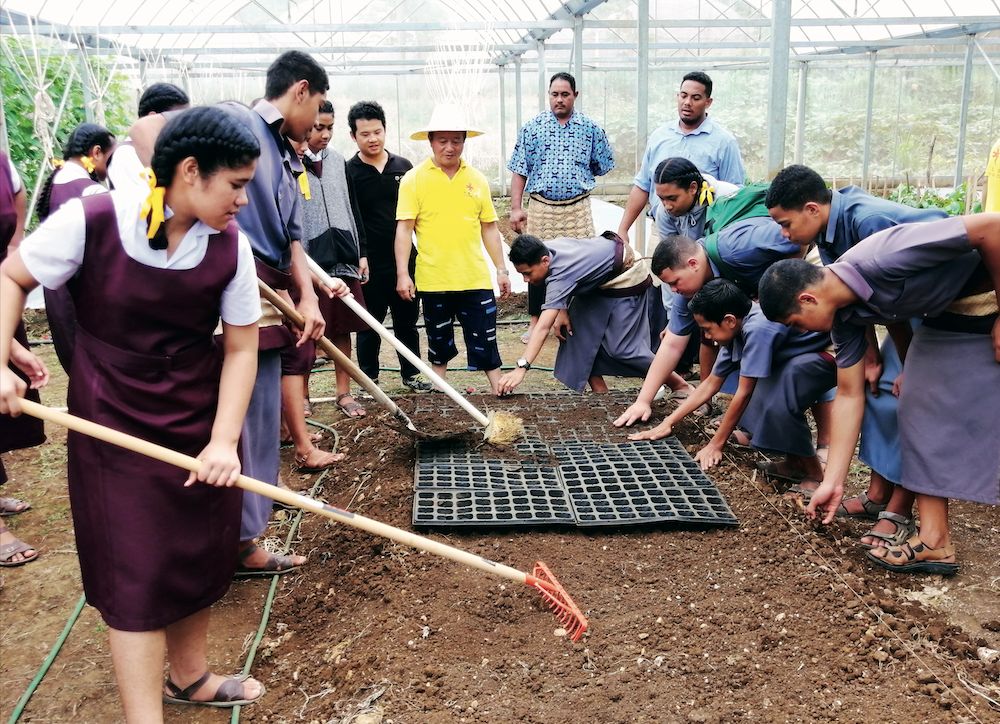
⬆ 农学实践课,学生在中方专家组专家的指导下进行穴盘营养土灌装
道阻且长:农业发展的困局
《中国投资》:我们了解到,贵国的农业、渔业和旅游业属于支柱性产业,其中农业为重中之重。因此想跟您了解一下当地的农业发展概况:传统的农业类型以及主要的农作物或农产品有哪些?
Viliami T. Manu:农业生产是汤加食品供应的重要一环。据统计有65%的家庭参与块茎类作物或者是其他农产品的种植,这是因为部分家庭种植能够做到自给自足,并且当地很多农民程度较低:一方面在于部分家庭种植以自给自足为主,另一方面是因为当地很多农民种植香草、卡瓦、菠萝等,其目的并非用于出口,因此在做商业农户统计的时候他们未被纳入其中。汤加最重要的农产品是块茎类作物,主要有芋头,山药、木薯和红薯;主要的牲畜是生猪和家禽。汤加目前最重要的出口农产品是西瓜,海外市场比较稳定,但只有很少的农户能从中获得利润,因此汤加专事出口种植的农户从60户降到了30户。
Semes Silbanus:波纳佩(密克罗尼西亚联邦首都所在岛屿)的农业发展情况良好,但还有不足。波纳佩人通常在丛林中种植山药、卡瓦等作物。此外,我们的主要作物还有山药、芋头、香蕉、椰子和面包果。
《中国投资》:请问贵国农民在就业人口中的比例以及农民内部的年龄段比例如何?他们在就业人群中的收入情况如何?
Viliami T. Manu:目前在汤加从事农业活动的农民大部分年纪都很大了,年轻人更偏向于去海外打工而非务农。所以现阶段,(农业方面的)培训和教育十分重要。目前我国有两家专门的农业教育机构,学生们可以在那儿获得农学专业的学位和文凭。中国农业援助项目与本地学校建立了长期合作,并给学生提供农学实践基地,为汤加培养新一代年轻农民做出了很大的贡献。
Semes Silbanus:在波纳佩,只有少数人以务农为职业,大多数人只在周末种一些山药和卡瓦,仅仅依靠农业维持生计并不容易。
《中国投资》:人与自然息息相关,农业往往是一个“靠天吃饭”的产业,自然环境对农业发展上限有较大的影响。您是怎么看待自然条件对当地农业的影响?对于不利的方面,目前是否已经有一些被解决?
Viliami T. Manu:汤加传统的农业没有灌溉技术。当干旱比较严重时,就会产生巨大的损失,这时候农民们会意识到灌溉系统的重要性。但是当天气回归正常,农户就会忘记这一点。我们需要更多有关灌溉工程的培训和基础设施。中国农业援助项目很早就已经在汤加建立示范性雨水收集和滴灌系统了,很好地回应了农户的需求。
Eugene Joseph:我们不像中国有很多适合大规模生产农产品的土地。更重要的是,密联邦的气候多雨高湿,严重妨碍了农业生产。中国示范农场团队正在推广大棚种植技术,这是缓解气候条件制约的一个很好的选择。
《中国投资》:近年来,通过新技术和新模式的探索,目前贵国的农业经济类型是否有改变?如有,是什么新类型?请问有哪些特征?
Viliami T. Manu:化肥对我们来说是新事物,但是农户们需要学习如何适当、适量地使用。目前汤加农产品出口主要依靠西瓜和南瓜,通过使用肥料,只需要三个月就可以收获。生产过程也是全部标准化,特别适合出口。
Eugene Joseph:是的,当地农民正在改变他们的耕作方式,他们意识到农业生产转向大规模化和高效化的重要性。他们建造自己的大棚,用地膜覆盖土地,使用更多的有机肥料,这些都是从中国专家那里学来的。
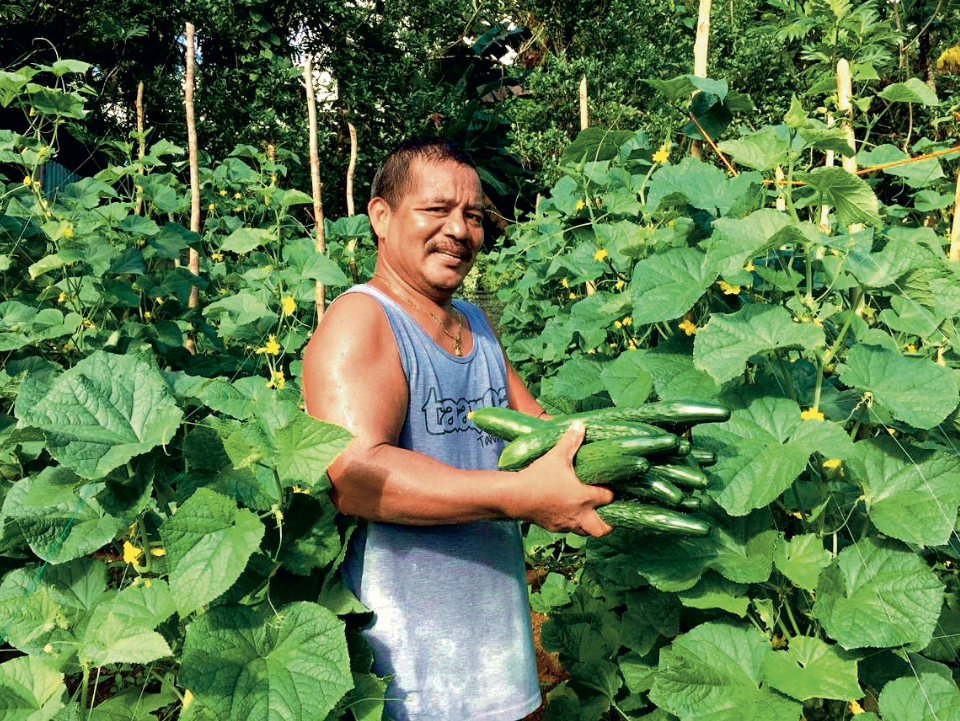
⬆ 农户展示利用沼液沼渣种植黄瓜
足履实地:中国援助项目的破局之策
《中国投资》:前不久中国驻汤加使馆阮德文临时代办去看望援汤中资企业,其实中国自1998年起就与贵国在农业领域有很多合作,也不乏一些优秀企业代表,例如湖南国际工程。对于湖南国际工程引进的大棚蔬菜以及沼气工程技术,您认为对当地农户的生活状况,例如收入、居住环境、饮食结构等是否有起到实效?
Viliami T. Manu:传统汤加农业的种植模式是轮作 。“猪-沼-菜”生态循环清洁农业模式的引入提高了土地的利用率,能够常年耕种。沼气对于汤加来说也是新事物,相比于昂贵的天然气,沼气的应用大大降低了普通家庭的生活成本。该农业模式基本没有浪费,对生态友好。以前我们缺乏蔬菜,现在蔬菜种植让汤加人的饮食更健康了。
《中国投资》:据我们了解,湖南国际工程推广“猪-沼-菜”生态循环清洁农业模式,在当地应用收效良好。您认为是什么原因让这种模式得以普及?在哪些方面符合当地的条件与需求?
Viliami T. Manu:民众收入的增加是“猪-沼-菜”模式受到汤加人欢迎的原因。据我了解,在这个模式中,蔬菜带来的利润最多,基本每天都能带来收益;养的猪能够自己食用也可以出售;沼气则主要能减少家庭开支。
Eugene Joseph:我认为这种生产方式很适合波纳佩的实际情况,比如大棚可以防止雨水冲走肥料,沼气的利用可以节约资源,而发酵猪粪便可以保护环境,避免排泄物直接流向开阔的田地,污染水资源。
《中国投资》:在农业技术推广方面,湖南国际工程做了不少努力,例如联合农业局,专门制作了沼气使用说明和安全注意事项张贴画等浅显易懂的印刷品和宣传资料。您如何看待中国援外技术专家的工作?
Viliami T. Manu:我认为特别好。对于蔬菜种植和生猪养殖,汤加人有一些基础认识,但沼气需要一些额外的知识和技能,在培训方面中国专家做了很多努力。在农博会上,国王也多次亲临视察中国专家的展位。
Semes Silbanus:当地人民感谢中国专家团队的辛勤工作,他们教会了当地百姓真正有用的专业知识。
《中国投资》:湖南国际工程在贵国还建设有种苗培育机构以及生猪人工授精站,并且在逐步实现作物种子和技术人员的本土化。您认为本土化交接是否必要?在哪些方面会起到作用?
Viliami T. Manu:育苗和生猪人工授精还在逐步推广过程中,按照传统模式种植蔬菜和养殖生猪,很少有农户能挣到钱。而新知识和新技术的引进将使更多农民能从农事活动中挣到钱。
Semes Silbanus:苗圃和人工授精站受到当地农民的欢迎。示范农场的目的和目标是在密联邦推广中国农业技术。我认为只有当地人民掌握了技术,才能将技术应用于大规模生产,并扎根当地。
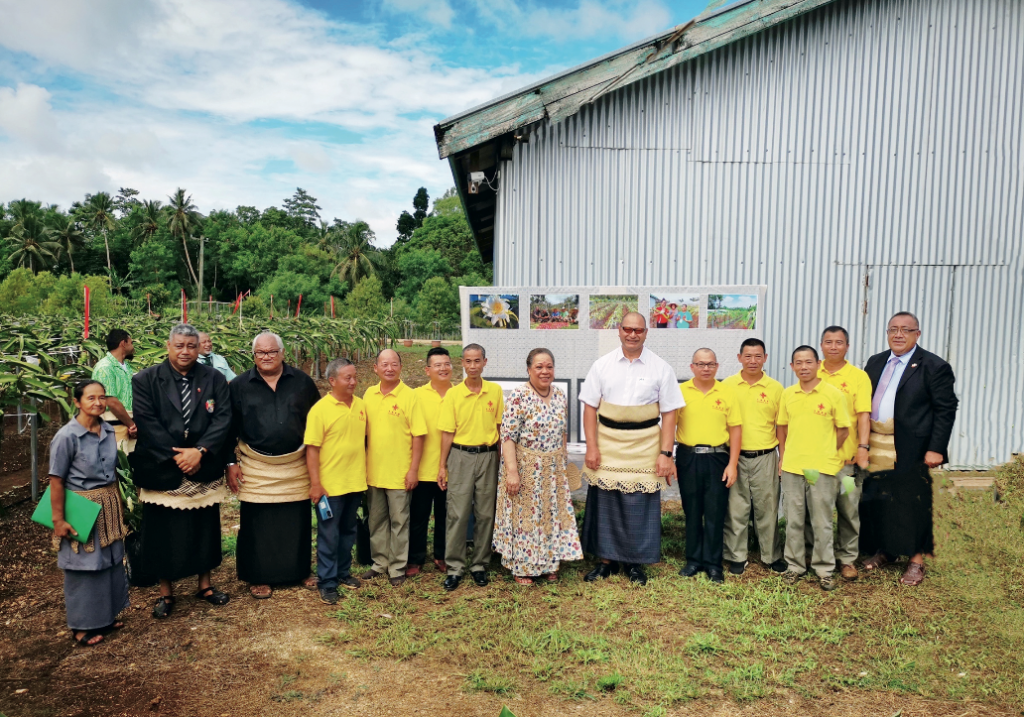
⬆ 汤加王国国王图普六世、王后娜娜茜帕乌视察项目瓦瓦乌农场中方示范区
行稳致远:双边合作的典范
《中国投资》:中密在渔业、旅游业、基础设施建设、教育等多方面都有合作,请问您认为中国援助是否具有针对性?能谈谈具体的例子吗?
Eugene Joseph:我认为援助是有意义的,我们有丰富的渔业资源,但我们自己没有与之相匹配的捕捞能力。中国企业还为我们修建了高速公路和桥梁,这是密联邦现在急需的。
《中国投资》:中汤在渔业、旅游业、基础设施建设等多方面都有合作,定期还有赴中进行的不同领域的援外培训;我们想了解一下这些学员目前在当地的就业情况,是否在对应领域能为汤加发展起到帮助?
Viliami T. Manu:目前汤加有80~100名学生在中国攻读学位,且有奖学金资助。前几年很多学生学习全球健康学,现在更多学生选择了不同专业,例如农业、教育学还有哲学。这些海外的留学生回到汤加后,有一半在汤加教育系统工作,其余的学生广泛分布在全国各地,为各行各业的发展做出贡献。
《中国投资》:我们看到当地学生、农户等参与过中国驻密联邦举办的诸如“感知中国”“农产品烹饪展示”等开放日活动。请问当地百姓对于中国援助的接受度如何?他们是怎么看待中国援助的?
Eugene Joseph:当地百姓,不管是学生还是农民,他们喜欢参加此类活动,从活动中他们能学到一些对他们个人需要有帮助的东西。总体而言,群众的反响还是不错的。
《中国投资》:我们注意到,中国援助了诸如渔船引擎、缝纫机以及妇女炉灶培训等社区民生项目,请问当地百姓对于中国提供的捐助以及培训项目的接受度如何?他们怎么看待中国援助的?
Viliami T. Manu:最令我印象深刻的是中国专家对妇女进行的技术培训。传统汤加社会里,女性是不直接参与农业的。但随着越来越多家庭菜园的出现,妇女已经成为农业生产的一员,这是一个新现象。一些金融机构提供的数据显示,他们99%的贷款都借给了女性种植团体。相较于男性群体,女性群体相互帮助,抵御风险能力更强,金融机构也更愿意把钱贷给她们。中国技术专家组为妇女团体提供培训,免费为家庭种植提供菜苗;专家们还向社区种植园提供上门技术服务,为妇女团体的家庭种植农业发展做出重要贡献。
《中国投资》:在两国的合作过程中是否有遇到国内或者国际上的阻力?是否解决?如是,是怎么解决的?如否,阻碍有哪些?
Viliami T. Manu:技术可以传授,物资可以赠送,但问题的关键在于人们接受新事物的能力。我们知道,观念的改变需要时间,在看到显著的成果之前要有足够的耐心。
Eugene Joseph:是的,一些政客会有一些担忧,但大多数当地百姓不太关心政治,他们欢迎援助,无论这些援助是来自中国的还是其他国家。
《中国投资》:您认为贵国是否需要为中国援外企业提供政策支持或便利措施?是否已有具体的优惠政策或激励措施?
Viliami T. Manu:汤加政府对中国援助项目非常重视,国王图普六世曾参观中国在主岛和瓦瓦乌岛的示范农场。经过多年的推广,火龙果已经出现在当地市场上了,但是就推广而言,还有很多工作需要落实。
Eugene Joseph:目前还没有具体的措施,也没有相关的政策,但我希望我们的领导人后续会提出,以造福我们的人民。
《中国投资》:中国与贵国在各领域的合作模式、内容以及规模和其他援助国有什么不同?其经验和特点在哪?
Viliami T. Manu:中国的农业专家都是长期在田野工作的,而其他国家援助项目的工作人员更多只是短期的。有些国家的援助项目会做一些漂亮报告,但很少把工作落到实处。两相比较,中国农业援助项目的超越是全方面的。
Eugene Joseph:中国人喜欢帮助我们发展基础设施,修建体育场馆、高速公路、桥梁等,这些都是有形的。我认为也许这就是中国的发展方式。
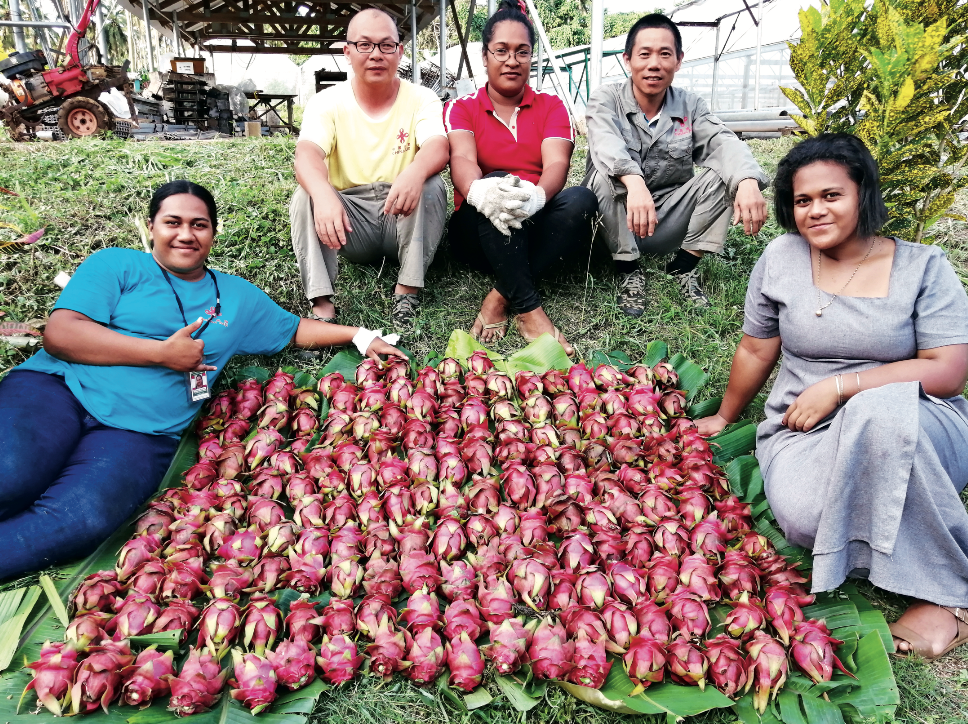
⬆ 专家组与汤方瓦瓦乌农业分局采收中方示范区产出的火龙果
大有可为:走向互利共赢
《中国投资》:经过多年努力,当地农户实现了家庭开支成本下降,粮食出口创汇增加。对于未来本地农业的发展,请问您有什么期望?
Viliami T. Manu:在汤加,最富裕的农户通常是种植蔬菜的。采用汤加传统的轮耕方式,每6个月就需要更换土地,每年土地利用率只有25%~50%。现在我们得到了中国的农业技术援助,通过使用沼液和沼渣等有机肥,土地全年的利用率能够达到100%。
Eugene Joseph:一些农民通过将中国技术应用到他们的农业中,确实获益良多。对于未来的发展,我们希望有更多像湖南国际工程这样的中国企业来帮助我们,尤其在畜牧、家禽等领域。
《中国投资》:针对本国的发展现状,请问您对贵国未来整体经济发展的领域与形式等方面,有哪些期待?
Viliami T. Manu:汤加每年仍需从国外进口很多肉类产品,所以增加本土的肉类产出对汤加非常重要,其中,家禽的养殖尤为关键。中国援汤加农业技术项目第五期和第六期的家禽养殖部分是对这一目标的有力支撑。汤加有一些牛肉铺,但我们的职业屠夫较少,导致牛肉的供应并不稳定。生猪养殖还未形成规模,相信中国援助能够促进汤加畜牧业的发展。
Eugene Joseph:除农业以外,我们希望密联邦的加工业也能在外援的帮助下得到发展,加工业发展的不足对我国而言也是一个亟待解决的问题。
《中国投资》:最后,今年是中汤建交26周年和中密建交35周年,双方合作也持续向好。请问在您看来,双方合作前景如何?还可以开展哪些领域的合作?
Viliami T. Manu:我强烈建议在中国援汤加第七期农业项目继续大力发展沼气,相关的申请我也于昨日递交到了中国驻汤加大使馆。我同样对第七期项目的组培实验室和土壤成分实验室将给汤加农业发展带来的帮助充满期待。未来十年,我们计划种植一百万棵树,中国援汤加农业项目的椰子专家让我意识到了椰树种植管理的紧迫性,我们将按照中国椰子专家给出的规划来优化椰树管理。
Eugene Joseph:如我之前所述,中国可以在帮助密联邦发展加工业方面发挥重要作用,比如加工当地的香蕉、面包果、山药等产品,替代进口食品,保障国家粮食安全。
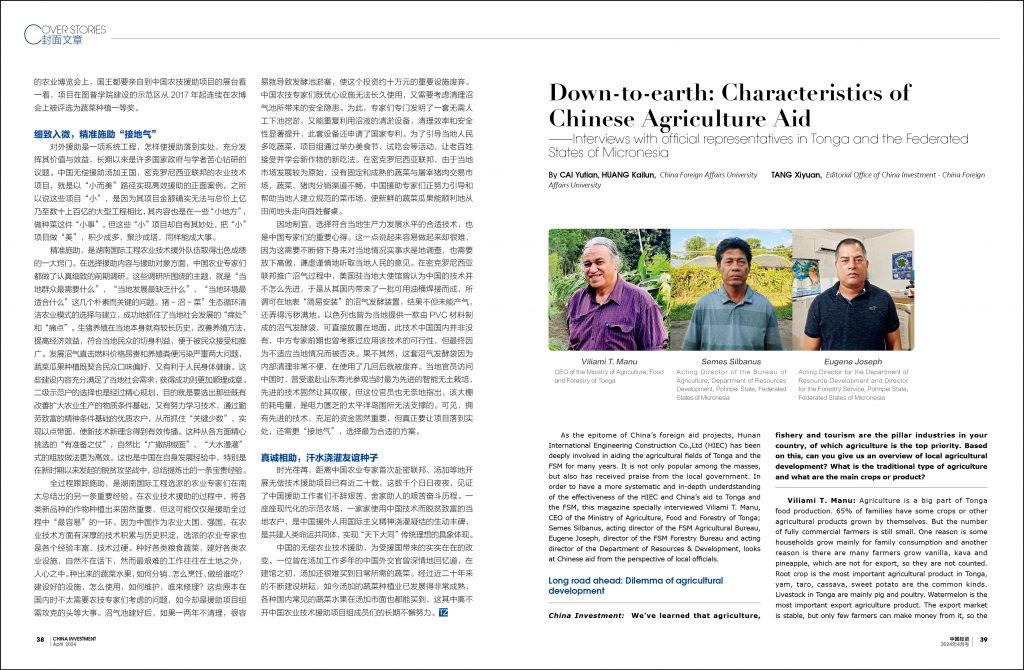
Down-to-earth: Characteristics of Chinese Agriculture Aid
——Interviews with official representatives in Tonga and the Federated States of Micronesia
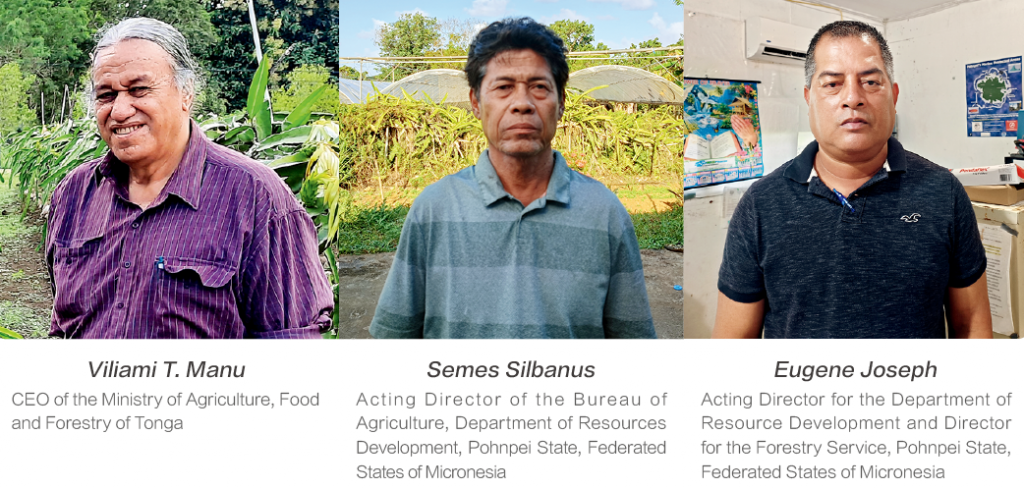
As the epitome of China’s foreign aid projects, Hunan International Engineering Construction Co.,Ltd (HIEC) has been deeply involved in aiding the agricultural fields of Tonga and the FSM for many years. It is not only popular among the masses, but also has received praise from the local government. In order to have a more systematic and in-depth underdstanding of the effectiveness of the HIEC and China’s aid to Tonga and the FSM, this magazine specially interviewed Viliami T. Manu, CEO of the Ministry of Agriculture, Food and Forestry of Tonga; Semes Silbanus, acting director of the FSM Agricultural Bureau, Eugene Joseph, director of the FSM Forestry Bureau and acting director of the Department of Resources & Development, looks at Chinese aid from the perspective of local officials.
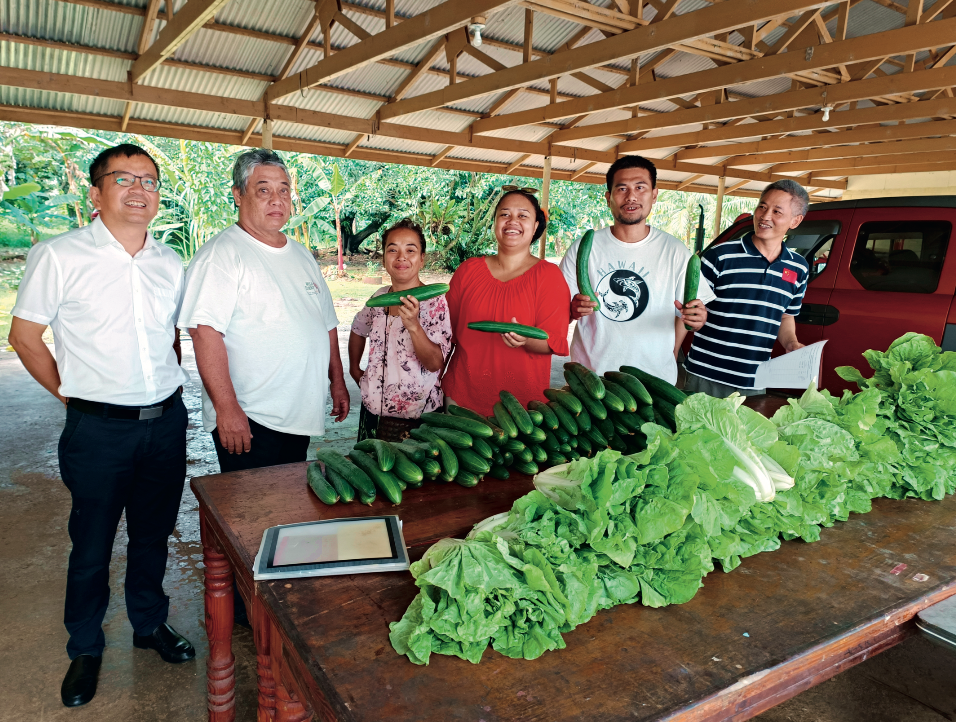
⬆ Handing over produced vegetables to the Bureau of Agriculture
Long road ahead: Dilemma of agricultural development
China Investment: We’ve learned that agriculture, fishery and tourism are the pillar industries in your country, of which agriculture is the top priority. Based on this, can you give us an overview of local agricultural development? What is the traditional type of agriculture and what are the main crops or product?
Viliami T. Manu: Agriculture is a big part of Tonga food production. 65% of families have some crops or other agricultural products grown by themselves. But the number of fully commercial farmers is still small. One reason is some households grow mainly for family consumption and another reason is there are many farmers grow vanilla, kava and pineapple, which are not for export, so they are not counted. Root crop is the most important agricultural product in Tonga, yam, taro, cassava, sweet potato are the common kinds. Livestock in Tonga are mainly pig and poultry. Watermelon is the most important export agriculture product. The export market is stable, but only few farmers can make money from it, so the number of households growing for export has been reduced from 60 to 30.
Semes Silbanus: Our agriculture in Pohnpei is good but not good enough. Our main crops include yams, taro, sakau, banana, coconut and breadfruit.Traditionally people in Pohnpei plant crops in jungle such as yam and sakau.
China Investment: What is the proportion of farmers in the employed population in your country? What about the age distribution? Compared with other employed persons, what is the level of the income of farmers?
Viliami T. Manu: In Tonga, most of the farmers are old, young people are more likely to work overseas rather than farm. So at this stage, training and educating are very important. Now we have two agricultural education institutions, students are able to earn degrees and diplomas in agriculture from there. China Agricultural Aid Project established a long-term cooperation with local schools, they provided agronomy practice base for students, which made a great contribution to cultivating a new generation of young farmers in Tonga.
Semes Silbanus: In Pohnpei only a few people go in for farming as a profession, most people plant some yams, sakau only on weekends, It’s not easy to make a living solely from agriculture.
China Investment: Nature is closely related to humain. Agriculture is actually an industry dependent on the weather, and the natural environment has a big impact on the upper limit of agricultural economic development. What do you think of the assistances and restrictions for natural conditions to local agriculture? Is there any restriction has already been solved?
Viliami T. Manu: Traditional agriculture in Tonga has no irrigation. When the drought is severe, as it was last year, the damage is significant. Local farmers realize they need irrigation. But when the weather back to normal, they forget all of it again. We need more trainings and infrastructures for irrigation. China Agricultural Aid has been demonstrating rainwater collection and irrigation for a long time, which filled the needs of our farmers.
Eugene Joseph: We don’t have much land suitable for mass production of agricultural products as in China. What is more, we have a rainy climate which hampers agricultural production. The Chinese pilot farm team is promoting farming in greenhouses which is a good option of alleviation of the restriction.
China Investment: In recent years, by explorating new technologies and new models, has the type of agricultural economy in your country changed? If so, what is the new type and what are the characteristics?
Viliami T. Manu: Fertilizer is new to us, but farmers need to learn how to use it in the right method and amount. Tongan export now depends on watermelon and squash, by using fertilizer, it will take only 3 months to be ready to harvest. The production process is also standardized, which is really suitable for export.
Eugene Joseph: Yes, the local farmers are changing their way of farming, they realized the importance of mass production and efficiency of input. They build their own greenhouses, mulch the plots, using more organic fertilizers that are learnt from the Chinese experts.
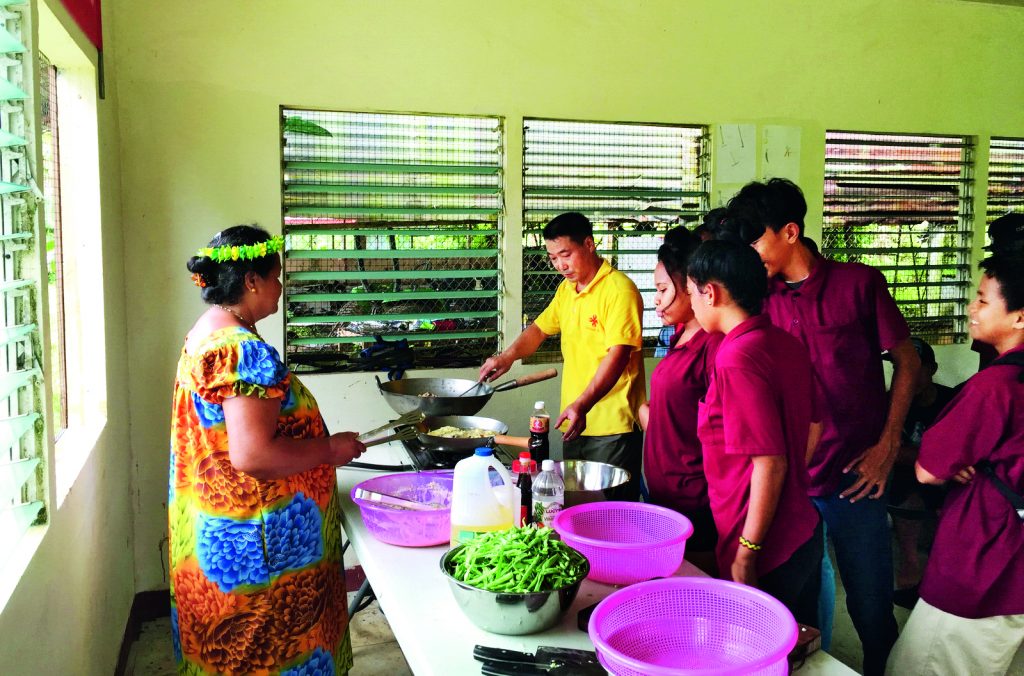
⬆ Culinary training by Chinese expert
Down to earth: Solutions by Chinese aid project
China Investment: As for the Greenhouse Vegetables and Biogas Technology introduced by HIEC, do you think they have actual effects to improve the living conditions of local farmers, such as income, living environment and diet structure?
Viliami T. Manu: Traditional Tongan way of agriculture is shifting, by using “pig-biogas-vegetable” agriculture model, we can grow on the land all year round. Biogas is also new to Tonga. The natural gas is very expensive in Tonga. Using biogas can bring down live expenses for normal households. The “pig-biogas-vegetable” agriculture model has almost no waste, it is totally environment friendly. Our traditional diet lacks vegetables, the growing of vegetables bring Tongan a healthier diet.
China Investment: As far as we know, HIEC has successfully helped to establish a batch of Secondary Demonstration farms to promote the “pigs-biogas-vegetables” eco-cycle organic agricultural mode. In your opinion,what makes this mode be popular? In what aspects does it meet the local conditions and needs?
Viliami T. Manu:The biggest benefit is this mode allows farmers to earn more money, that’s the reason. From my understanding, in the “pig-biogas-vegetable” agricultural system, the most money comes from vegetables, which can bring in income every day. Pigs are both food and money. The main function of biogas is to reduce the living cost.
Eugene Joseph: I think this production mode suits the real conditions in Pohnpei, for example, the greenhouse can prevent the rain from washing away the fertilizers, save up resource by using biogas, and help protect the environment by fermenting the wastes of pigs,which also avoid the wastes flowing directly to the open field and contaminating the water resources.
China Investment: HIEC has made a lot of efforts to promote agricultural technology, such as collabrating with your Agriculture Bureau, making some simple press and publicity materials specially such as biogas use directions and posters of Safety Instructions. What do you think of the work of the Chinese foreign-aid experts?
Viliami T. Manu: Very very well and good. For the vegetable growing and pig raising, Tongan have some basic knowledge. But biogas need some extra knowledges and skills, Chinese experts have made a lot of efforts in training. The King also visited the Chinese experts’ booth in the Agriculture Show many times.
Semes Silbanus: The local people are grateful to the Chinese expert team who are hardworking and they teach the local people real expertise.
China Investment: HIEC has also built locally Seedling Breeding Institution and Pig Artificial Insemination Stations, where the localization of crop seeds and technicians are gradually realized. Do you think the localization is necessary? In what ways it works?
Viliami T. Manu: The seedling breeding and AI for pig still on its way to publicity. By using traditional ways of growing vegetables and raise pigs, very few farmers can make money. The introduction of new knowledge and skills can let more people make money through agriculture.
Semes Silbanus: The nursery and AI station are popular among local farmers. The purpose and aim of pilot farm is to promote the Chinese agricultural technologies in the FSM. I think only after the local people master the technology can the technology be applied to mass production and rooted in the farming communities.
Make steady progress: Model of bilateral cooperation
China Investment: China-FSM have cooperations in fishery, tourism, infrastructure construction, education and so on. Do you think China’s assistance is pertinent? Can you give us some specific examples?
Eugene Joseph: I think the assistance is relevant, we have abundant fishery resources but our country does not have the matching fishing capacity. Chinese companies also built highways and bridges for us, which are urgently needed here.
China Investment: China-Tonga have cooperations in fishery, tourism, infrastructure construction and other domains, there is also regular Foreign-Aid training in different fields, which your trainees will trained in China. We want to know the current employment situation of these trainees, whether they can help Tonga in the corresponding area?
Viliami T. Manu: Now the Tongan students on scholarship in China is about 80-100. They all gonna receive formal degrees in China. Many students studied Global Health Studies in previous year, now there are more students study different majors, like agriculture, pedagogy and philosophy. When students who studied abroad return to Tonga, half of them work in ministry of education. The rest goes all over the country and contributes to various sectors.
China Investment: We have seen some local students and farmers participate in the Open Day activities such as “Experience China” and “Agricultural Products Cooking Show”, which were organized by Chinese Embassy. What do the local people think of the Chinese aid? What about their acceptability of these assistances?
Eugene Joseph: The local people, students or farmers, they like participating in these activities where they learn somethings that are helpful to their specific need. Overall, it has a good response among the people.
China Investment: We have noted that China has assisted community livelihood projects such as fishing boat engines, sewing machines and stoves training for women. What do the local people think of the China-Aid? What about their acceptability of these assistances?
Viliami T. Manu: The most impressive thing to me is the training of women. In traditional Tongan farming, women were not counted. But as more and more home gardens appeared in Tongan family, women became farmers. That was a new phenomenon. I have statistics from some financial institutions, 99% of their loans go to women’s groups. They told me that compared to men, women’s groups are more cooperative and persistent, they prefer women’s groups to men’s. The Chinese Technical Team provides training for women’s groups, give them free vegetable seedlings for home planting. They also provide technical services for community plantations, contributing a lot to home-growing for women’s groups.
China Investment: Is there any domestic or international resistance in the process of cooperation between the two countries? Has it been solved? If so, how does it work out? If not, what are the obstacles?
Viliami T. Manu: Skills and infrastructure all can be solved by government train and investment. The most important thing is people’s ability to accept new things, We know that changing perceptions take time. We shall be patient until we can see more results.
Eugene Joseph: Yes, there are some concerns among some politicians, but most local people don’t care much about politics, they welcome assistance, whether is from China or from any other countries.
China Investment: Do you think your country need to provide policy support or facilitation measures for Chinese foreign aid enterprises/aid teams? Are there already any specific preferential policies or incentive measures in some collaborative fields?
Viliami T. Manu: China-Aid is more than welcomed in Tonga. The King have visited Chinese demonstration complex both in Nukualofa and Vava’u for many times. After years of promotion, we can now see dragon fruit in the market. However, more work need to be done to promote the Chinese agricultural mode.
Eugene Joseph: So far there aren’t such specific measures nor relevant policies, but I hope our leadership will do so for the benefit of our people.
China Investment: As for the mode, content and scale of the cooperations with your country in various fields, what are the differences between China and other assisting countries? What are Chinese experience and characteristics?
Viliami T. Manu: For the Chinese project, all the experts in the team work on the field full time. For most of the project from other countries, they only work for a short time. They can make big report, but they only work for small time. The Chinese project surpass them on all level.
Eugene Joseph: The Chinese like to assist us in developing our infrastructure, constructing stadiums, highways, bridges, etc., which can be so tangible. I think maybe this is how China develops
A bright future: Road to Mutual Benefit
China Investment: After years of efforts, your farmers have fulfilled the reduction of household spending costs and Tonga’s Foreign Exchange Earning has also increased. What are your expectations for the future development of local agriculture?
Viliami T. Manu: In Tonga, the richest farmers are all vegetable famers. Using traditional farming methods, they need to shift land every 6 months, only 25-50% can be put into use every year. Now we have agricultural technology aided by China, with the use of biogas residues, farmers can use 100% of the land all year round.
Eugene Joseph: Some local farmers really benefit a lot by applicating the Chinese technologies to their farming. As for the future development, we hope more Chinese enterprises like HIEC can come to assist us, in the field of livestock farming, poultry, etc.
China Investment: As for the current development situation of your country, what are your expectations on the areas and forms of the future overall economic development to your country?
Viliami T. Manu: We still need to import a lot of meat every year. Increasing local meat production is very important to us. In order to make it happen, poultry farming is the most important thing to do. The poultry farming component of the fifth and sixth phases of China-Aid Project provides much support for this goal. We have some beef shops, but there are not enough butchers in Tonga, which makes the supply of beef unstable. Pig farming has not yet formed a large scale, I believe China-Aid can helps us a lot.
Eugene Joseph: In addition to agriculture, we also hope our processing industry can furthrt develop with the assistance of Foreign-Aid, this is also an urgent problem for us.
China Investment: The last question, this year is the 26th anniversary of the establishment of diplomatic relations between China and Tonga(35th anniversary between China and the FSM), and the cooperation show a steady trend of improvement. In your opinion, what is the prospect of Sino-Tongan (Sino-Micronesia) cooperation? What other areas of cooperation can be rolled out?
Viliami T. Manu: I strongly recommend the continued development of biogas system in the seventh phase of China Agricultural Aid Project. I have sent the request to Chinese embassy in Tonga yesterday. I also believe the tissue cultivation and soil content analysis lab can help us a lot. There is also an “1 million trees planting” schedule for next 10 years, after I heard the explanation from coconut experts, I realized that the management for coconut tree plantation is very urgent. We will optimize the coconut trees according to the ten-year development plan formulated by Chinese experts.
Eugene Joseph: As I just said, China can play an important role in assisting the FSM in developing our processing industry, process the local products such as banana, breadfruit, yams etc., which are the substitutes for the imported food and can also ensure the food security.

